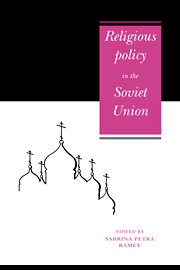Preface
Published online by Cambridge University Press: 03 December 2009
Summary
This is a book about religious policy and policy makers in the USSR. Its purpose is to shed light on the thinking, goals, assumptions, methods, and instruments of policy. The essays collected herein embrace a wide range of subjects, covering both historical and contemporary themes. Several chapters examine the institutions and mechanics of Soviet religious policy, especially Otto Luchterhandt's chapter on the Council of Religious Affairs. Jane Ellis' chapter on Kharchev's revelations, and John Dunstan's chapter on education. Other chapters concentrate rather on policy decisions and actions, trying to account for changes and stabilities in the evolution of Soviet religious policy. These include Philip Walters' chapter, along with Larry Holmes' chapter on schools and religion in the period 1917–41, John Anderson's chapter on women and religious policy, and my own chapter on the Gorbachev era. Still other chapters focus on the perspectives and drives of the religious organisations themselves, such as Oxana Antic's chapter on modern cults, Jan Hebly's chapter on the Russian Orthodox Church and ecumenism, Myroslaw Tataryn's chapter on the re-emergence of the Greek-Rite Catholic Church in Ukraine, and Marjorie Balzer's chapter on religion in Yakutia. The contribution by Samuel Kliger and Paul de Vries takes a different road, drawing upon extensive interview data to examine values and normative attitudes among Soviet people. Finally, Anatolii Levitin-Krasnov's chapter on the Living Church re-examines some of the long-standing controversies surrounding this regime-backed schismatic movement. Taken collectively, these chapters cover a wide-ranging array of subjects, many of them hitherto neglected in the past.
It is by now a stock phrase to say that the questions raised in a particular field are as important as the answers.
- Type
- Chapter
- Information
- Religious Policy in the Soviet Union , pp. xvii - xxPublisher: Cambridge University PressPrint publication year: 1992

